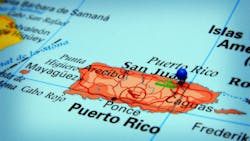Puerto Rico Microgrids Designed to Withstand Cat 5 Hurricanes
Power management company Eaton and Enel Group advanced energy services unit Enel X plan to collaborate on a second joint microgrid project in Puerto Rico.
The companies reported they will add a solar-plus-storage microgrid at Eaton’s Las Piedras manufacturing facility. They noted the microgrid will integrate nearly 5 megawatts, alternating current (MWac) of solar PV and approximately 1.1 MW/2.2 MW-hours (MWh) of battery storage into the facility’s onsite power generation systems. In late 2020, Eaton and Enel X revealed plans to deploy a microgrid system at Eaton’s Arecibo site.
The Las Piedras and Arecibo microgrids will boast a combined 10 MWac of solar PV and 2.23 MW/4.46 MWh of battery storage in Puerto Rico by 2022, pointed out Eaton and Enel X. The firms added the microgrid systems are designed to hurricane code in Puerto Rico and can withstand Category 5-strength hurricane-force winds. Moreover, they project that Eaton will be able to cut emissions by 8,345 metric tons in the microgrids’ first year of operations.
“The increasing frequency and impact of climate emergencies underscores the need for far more sustainable and resilient power,” remarked Brian Brickhouse, president of Eaton’s Electrical Sector, Americas region. “Around the world, we’re applying our Everything as a Grid approach to strengthen operations with low-carbon energy sources and the ability to withstand extreme weather emergencies. With our partner Enel X, we established a replicable energy-as-a-service model that exemplifies how to keep the power on – no matter what.”
Enel X will build, own, and operate the Las Piedras microgrid on Eaton’s behalf and will finance the project under an energy-as-a-service model. The companies noted the model will shift Eaton’s investment in the microgrid system from a capital to an operational expense. For its part, Eaton will provide installation expertise as well as microgrid controller and plant electrical distribution equipment.
“As extreme weather caused by the climate crisis becomes the new normal, commercial and industrial businesses need to adopt an integrated energy strategy and solutions that are both resilient and sustainable,” commented Enel X North America Head Surya Panditi. “Enel X is committed to delivering custom energy solutions that deliver economic value and meet any organization’s sustainability needs. Through our growing partnership with Eaton, we’ve developed a replicable gold standard for resiliency, emissions reductions, and energy cost-savings.”
Besides boosting resiliency at Las Piedras, the solar-plus-storage system will allow Eaton to generate, store, and consume renewable energy and discharge renewable energy back to the grid, Eaton and Enel X stated. The companies noted supporting the local grid in said manner will reduce emissions by limiting the need for carbon-intensive electricity during periods of peak demand.
About the Author
EnergyTech Staff
Rod Walton is senior editor for EnergyTech.com. He has spent 17 years covering the energy industry as a newspaper and trade journalist.
Walton formerly was energy writer and business editor at the Tulsa World. Later, he spent six years covering the electricity power sector for Pennwell and Clarion Events. He joined Endeavor and EnergyTech in November 2021.
He can be reached at [email protected].
EnergyTech is focused on the mission critical and large-scale energy users and their sustainability and resiliency goals. These include the commercial and industrial sectors, as well as the military, universities, data centers and microgrids.
Many large-scale energy users such as Fortune 500 companies, and mission-critical users such as military bases, universities, healthcare facilities, public safety and data centers, shifting their energy priorities to reach net-zero carbon goals within the coming decades. These include plans for renewable energy power purchase agreements, but also on-site resiliency projects such as microgrids, combined heat and power, rooftop solar, energy storage, digitalization and building efficiency upgrades.
